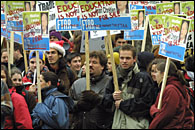Globalization and education
Educating the globalizers
There were drummers, there was free food, colourful costumes and dancing students. No matter how high the spirits, the thousand-plus students gathered on McGill's lower field on the afternoon of October 31 were serious in their intent - protesting the Free Trade of the Americas Agreement (FTAA) being negotiated that day in Quito, Ecuador.
Students from McGill, UQAM, Université de Mon-tréal and several CEGEPS joined a larger group that marched down Ste. Catherine Street from Concordia University. The marchers - some estimates put them at 7,000 strong - wound through the downtown core, pausing at Place des Arts before finishing at Berri Square.
 Drummers set the beat for the FTAA protestors
Drummers set the beat for the FTAA protestorsPHOTO: Owen Egan |
|
"I'm very pleased at how it came out. The logistics of all these different groups getting together - and keeping the focus on the message - was very difficult," said Nick Vikander, SSMU vice-president community and government, who helped organize the march. Vikander explained that the SSMU, which traditionally has stayed out of international issues, became involved because of the threat it believed the FTAA posed to universities in Canada.
"In the end the SSMU became involved in this issue because free trade and the FTAA could have a direct impact on public education," he said. "It was a very timely issue."
Unlike anti-FTAA protests in Quebec last year, this march was almost entirely peaceful. But what, precisely, was it about?
David Wise is the vice-president external for the Post-Graduate Students' Society, which, along with the SSMU and the Fédération Étudiante Universitaire du Québec, helped bring together the rally. Wise explained that the idea for it started with student organizations in Quito that were concerned about the lack of transparency in the FTAA negotiation process. Wise explained that Canadian student groups wanted to show solidarity, but also had their own concerns about the agreement.
"The GATS [General Agreement on Trade and Services] agreement characterized education as a potential commodity… The FTAA is highly dependent on GATS. That might not be so bad. The problem is when we introduce Chapter 11," said Wise.
Chapter 11 is a section of the North American Free Trade Agreement that allows companies to sue a country's government for compensation if that country enacts laws that hinder their business. The FTAA agreement aims to create a free trade zone that would include all the countries in North and South America (except Cuba). Although still in negotiation, it may contain provisions that are very similar to Chapter 11. The nightmare scenario that brought Wise and several thousand other students to the streets on October 31 is that a private company could use chapter 11 to get funding from the Canadian government, on the basis that such funding is available to our public universities. Were that to happen, Canada's ability to fund our universities would quickly evaporate. Right now, Canada is trying to specifically keep education out of the FTAA.
"We want to make sure Canada stands by its commitment to keep education out of the agreements," said Wise. "Since they're in negotiation we have a chance to influence the outcome."
The PGSS invited a number of speakers in the weeks leading up to the rally to lecture on free trade and globalization. One of those speakers was Latin America expert Philip Oxhorn, associate dean of postgraduate studies and professor of political science. He is somewhat less concerned about the effect the FTAA agreement will have on education, explaining that public education is a sacred cow everywhere - even in the free-enterprise US.
"In every state of the union there is a public education system that they are very proud of," he said.
"Politicians aren't necessarily the smartest people around, but no one is that stupid."
 A crowd gathered at McGill to protest the FTAA on October 31
A crowd gathered at McGill to protest the FTAA on October 31PHOTO: Owen Egan |
|
Oxhorn explained that education has always been considered a special case in international trade law and would never be subject to the same rules as other sectors.
"People fear two things, and both of them are wrong. One is that because education is a ser-vice, and services are included in trade agreements, that education will be included, and that's not true - education is a special case. The other is that it will be seen as an unfair trade subsidy that Canadian companies benefit from," said Oxhorn. That also won't happen, he said, because, like health care, it isn't a service that is targeted to a specific sector or company. In other words, GM Canada has the same access to Canada's educated workers as Ford Canada, as does Nortel.
That's not to say that Oxhorn doesn't believe students needn't be concerned with the goings-on in Quito.
"Public education isn't endangered by the FTAA, I honestly don't think, but it is endangered by bankrupt countries that don't have money to pay for education," he said. If the FTAA does generate more wealth, as its proponents say it will, it introduces the real challenge for education.
"The key is to ensure that the wealth is distributed fairly, and people are educated and fed, so they can be productive members of society."
Like Wise, Oxhorn said Chapter 11 is also a real concern.
"It's been used to unravel environmental policies -that's real, that's something to protest against. The lack of regulation of capital flows is a problem. FTAA negotiations could allow for that, but they don't, necessarily. That's why it's important to pressure governments."
For his part, Wise disagrees with Oxhorn's characterization that education is protected legally or politically. Since the GATS and, so far, the FTAA do not explicitly reserve education as a government service, it remains vulnerable.
"We're relying on the good will and sensible natures of our political leaders when it comes to this question, and all you need to do is take a quick look around the country to realize that not having a clear exemption in black and white is not a good idea," said Wise.

